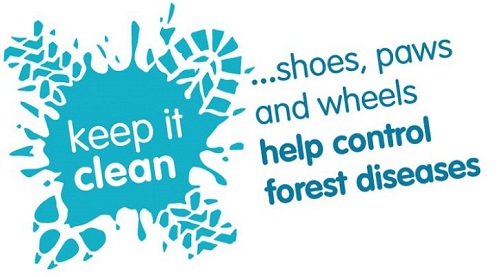Biosecurity
Everyone who lives in, works in or visits the Welsh countryside can reduce the risk of spreading pests and diseases by avoiding moving mud, plants or certain parts of plants such as leaves.
What is biosecurity?
Biosecurity refers to a set of precautions that can prevent the introduction and spread of harmful organisms such as pests, pathogens or invasive species.
Forest biosecurity
In a forestry context, pests and diseases refers to invertebrate pests - insects, for example - that are harmful to trees and to tree diseases caused by pathogens, such as certain bacteria and fungi.
Biosecurity is also very important in the control of invasive non-native species such as rhododendron, American skunk cabbage, Japanese knotweed and Himalayan balsam.
Why biosecurity is important
The threat to our forests and woodlands has never been greater. Trees and plants in Britain are now vulnerable to a range of new pests and diseases. This is a result of the increased movement of goods around the world. Outbreaks can result in economic losses for the forestry industry and for related industries, such as tourism.
Accidental transmission
It is not always possible to see pests and diseases and these can be transmitted accidentally, by people moving between different forests and woodlands. Pests are most often transported in soil or plant debris carried on footwear or on the wheels of vehicles and forest machinery. Diseases may also be spread via equipment used in forestry work.
Advice for visitors and forestry workers
Everyone who lives in, works in or visits the Welsh countryside can help slow the spread of pests and diseases by following some basic biosecurity measures.

Practical steps
There are practical steps we can all take to reduce the risk of moving insects and pathogens like fungal spores, which spread infestations or infections. In essence, this amounts to avoiding moving mud, plants or certain parts of plants, like leaves, which might harbour pests.
For forest visitors, this can be as simple as:
- Brushing dirt off boots or bikes when leaving a forest
- Cleaning boots and bikes thoroughly between visits
- Not taking any plants or foliage home
For more detailed guidance, which will be particularly useful to woodland workers, please see the following resources:
- Forest Industry Standard Practice and Biosecurity Guidance, produced by the Forestry Commission
- Further information and a video, provided on the Forestry Commission website
- For more information, or to report a tree health matter, please e-mail the tree health team at treehealth@naturalresourceswales.gov.uk.
- How to protect trees from pests and diseases when working in woodlands and forests













